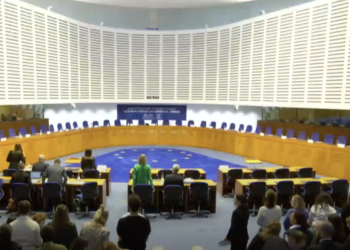In a landmark legal confrontation, six Portuguese youths have challenged 32 European nations.
Six Portuguese youths argue that 32 governments’ insufficient action on climate change violates their human rights. Initiated in September 2020, this case targets 27 EU member states along with Britain, Switzerland, Norway, Russia, and Turkey, making it the largest climate-related case in the Court’s history. A decision is anticipated in the first half of 2024. The plaintiffs, supported by the Global Legal Action Network and aged 11 to 24, are demanding a binding ruling compelling these states to intensify their efforts against climate change. They assert that the lack of action endangers their fundamental rights, including the right to life and physical and mental health.
One of the young applicants, 15-year-old Andre Oliveira, expressed his personal struggles with heat extremes, citing limitations in outdoor activities and sleep disturbances due to inadequate climate policies. The case, if successful, could mandate national courts to order governments to accelerate carbon dioxide emission reductions beyond current plans. However, the Portuguese government’s lawyer argued that the evidence presented did not sufficiently demonstrate the specific harm climate change had inflicted on the young applicants. Gerry Liston, a lawyer with GLAN, accused Portugal of gaslighting by dismissing the applicants’ experiences as imaginary, a stance taken on behalf of all the defendant states.
In a similar vein, Greece, another defendant, submitted that the recorded effects of climate change have not directly impacted human life or health. Gearoid O’Cuinn, another GLAN lawyer, labeled this stance as climate denialism. Despite criticism, Petros Varelidis from the Greek environment ministry insisted that the case was legally baseless, pointing to Greece’s ambitious climate policies.
Andre Oliveira, one of the applicants, previously stated their aim to hold governments accountable to their commitments under the 2015 Paris Agreement, which seeks to limit global warming to 2 degrees Celsius, preferably to 1.5C. According to the United Nations’ Intergovernmental Panel on Climate Change, current policies are inadequate to meet these targets. Four of the six plaintiffs hail from the central Portuguese region of Leiria, severely impacted by wildfires in 2017, which claimed over 100 lives. A British lawyer argued that while the consequences of climate change are global, the responsibility to protect the applicants lies with Portugal, advocating for the case’s dismissal.
The legal representation in the case was highly asymmetrical, with over 80 lawyers defending the accused countries, contrasted by just six lawyers representing the plaintiffs. This case is part of a growing trend in climate litigation worldwide. For instance, a U.S. court in Montana recently ruled in favor of young plaintiffs in a climate change lawsuit. Additionally, two other climate cases are pending before the ECHR’s Grand Chamber, indicating a rising recognition of legal avenues to address climate issues.






